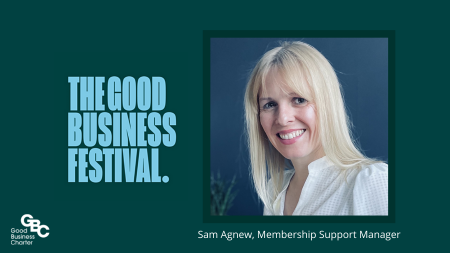Experiencing the Good Business Festival 2022
Sam Agnew, GBC Membership Support Manager:
Attending the Good Business Festival in Liverpool was a rare treat. The adoption of online meetings, workshops and festivals has made it easier for me to connect with others and access the information I need in a more sustainable way.
The programme was well thought out and speakers from large organisations, academia, thinktanks and microbusinesses came together to support, champion and inspire good business.
I was in my element. I spent the day scribbling notes so I could share what I’d learnt.
Mind the Gap
A 2020 survey from GlobalData found that 45% of shoppers are actively searching for sustainable products, goods and services.
Consumers say that climate change is an important issue, but cheap clothes, mass-produced meat and bargain foreign holidays fly off the shelf.
The panel discussed whether ethics really matter to today’s consumers or is this talk of ‘conscious consumerism’ just hot air?
Takeaways
People want to do the right thing but at the moment many are focusing on survival. Businesses should be judged on how they pay people. You can’t focus on Climate mitigation if you have low wages.
The situation with Russia has made us more aware of our supply chains – for example, we are now aware of where our oil comes from. Companies need to take more responsibility for their entire supply chain
Consumers need purchasing education – there are so many labels and pledges which can be distracting and make it harder to make ethical purchases
There needs to be a bigger emphasis on the circular and sharing economy. It will enable consumers to have the things they want without further extraction from the ground.
Build up your supply network of like-minded people and share resources.
Real Purpose or Greenwashing
In 2020, the Competition and Markets Authority announced that too many businesses were “falsely taking credit for being green” in order to woo environmentally minded consumers with recent analysis of websites found that 40% of green claims made online could be misleading.
The panel discussed the best way for businesses to communicate their green credentials while reducing the risk of misleading customers?
Takeaways
We have become cynical about people trying to do the right thing. Ethics washing has been around since businesses started marketing, now it’s greenwashing, soon it might be replaced with price washing.
Greenwashing is when an organisation knowingly lies and misleads people. It’s tainting those who are trying to do good. We should not be holding people to account for attempts to do better.
There are over 80 ethical clothing labels that companies use to help consumers feel better which makes it harder to know what to do for the best. Legislation is needed to make it easier for us to do the right thing
If you want to market your green credentials focus on the things you’ve done to create change.
The unlikely heroes – The power of the microbusiness
There were 5.7 million microbusinesses in the UK in 2020, accounting for 96% of all businesses.
The panel, including Paralympian Hannah Cockroft MBE, discussed the role they play in promoting social mobility and helping nations reach their green targets.
Micro-businesses have limited time and money, they need to collaborate and pool resources.
They are the lifeblood of local communities, they source locally, support local charities, sponsor local football matches.
People are looking for something with meaning, microbusinesses have incredible stories to tell.
Changing for Good
Many businesses no longer need to be persuaded by the business advantages of becoming an ethical business, as responsible business practices are becoming the status quo.
Though P&O has highlighted that we still have some work to do.
Many business leaders genuinely care about future generations and are driven by the moral responsibility to do the right thing. They are pushing for legislative change to raise standards.
Workers’ rights and conditions should be at the forefront of businesses decisions.
Worker Directors will drive more sustainable decisions.
People are still using unethical companies – Governments and unions have a role in removing unethical practices.
My thoughts from the day.
A groundswell of ‘good businesses’ has been created by an increasing number of consumers who want to buy from responsible businesses. With so many claims of ‘virtue signalling’ and greenwashing, it would be easy to become cynical.
Hearing the speakers and getting to know Good Business Charter accredited organisations, I feel that most people’s hearts are in the right place and care about making a difference to others, our planet and local communities.
We need to champion values-driven leaders – empathy, compassion, kindness, and service need to be encouraged and celebrated.
The Good Business Charter’s role in helping people to make ethical choices is needed more than ever. It’s easy for organisations to distract consumers with environmental claims, while not paying the real living wage or caring about employee wellbeing.Our components demonstrate responsible practices across the board.
I came away wanting to learn more about how we can support the circular and sharing economy. It would be great to hear your experiences of how your business shares and repairs your resources.

